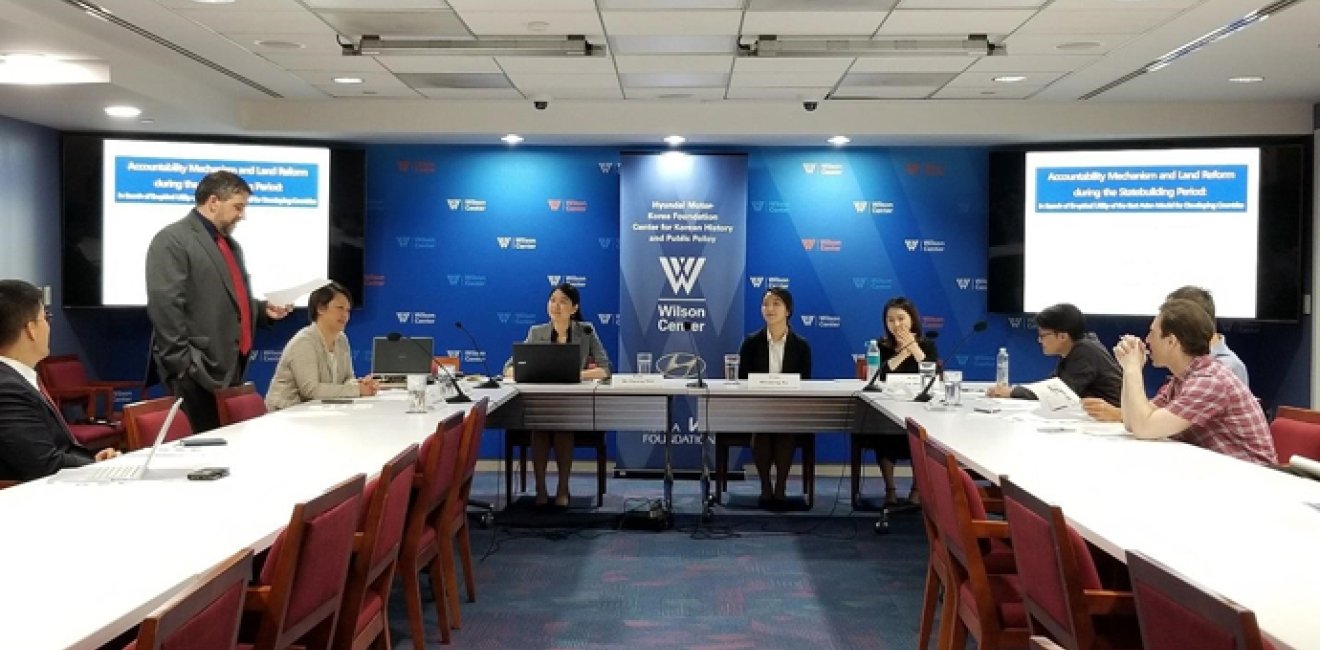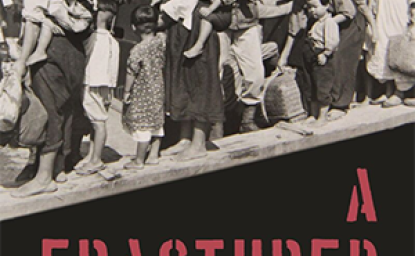
In this photo, Abraham Denmark, director of the Asia Program at the Woodrow Wilson Center, gives opening remarks for the 2018 Korea Foundation Junior Scholars’ Final Presentations at the Wilson Center. From L-R: Abraham Denmark, Jean Lee, Bo Kyung Kim, Minjeong Ko, Suna Jeong, Taekyoon Kim, Christian Ostermann, Gregg Brazinsky. (Photo credit: Sally Chung)
Three young South Korean scholars capped six months of research at the Woodrow Wilson Center by presenting their findings to fellow scholars on July 9. Korea Foundation Junior Scholars Bo Kyung Kim, Minjeong Ko and Suna Jeong shared research on accountability mechanism and land reform during state-building periods of three Asian nations; Soviet aid to Vietnam and North Korea, and aid negotiations between South Korea and the United States during the Syngman Rhee administration.
Each year, the Hyundai Motor–Korea Foundation Center for Korean History and Public Policy and the History and Public Policy Program welcome South Korean graduate students to conduct research at the Woodrow Wilson Center.
Abraham Denmark, director of the Asia Program, provided opening remarks. Jean Lee, director of the Korea Center, served as moderator while Dr. Christian F. Ostermann, director of the History and Public Policy Program, and Dr. Taekyoon Kim, Fulbright mid-career research scholar in residence at the Wilson Center, offered commentary.
The Hyundai Motor–Korea Foundation Center for Korean History and Public Policy would like to thank the Korea Foundation for its generous support for modern-day research on the two Koreas at the Wilson Center.
For more detailed information on each presentation, please see below:

Bo Kyung Kim, second from left, a KF Junior Scholar, gives her presentation. (Photo credit: Sally Chung)
“Accountability Mechanism and Land Reform during the Statebuilding Period: In Search of Empirical Utility of the East Asian Model for Developing Countries” by Bo Kyung Kim
Ms. Kim’s research examines critical success factors of land reform in Japan, South Korea and Taiwan under U.S. influence during the 1940s and 1950s. Analysis focuses on identifying an East Asian pattern of proxy accountability and the significance of strong local-level governance.

Minjeong Ko, left, a KF Junior Scholar, giving her presentation. (Photo credit: Sally Chung)
“Comparison of Soviet non-military aid to North Korea and North Vietnam in 1950-1960s” by Minjeong Ko
This research examines Soviet aid in early years of North Korea and North Vietnam statehood, looking at how Soviet policy is engraved in the two countries histories, from post-war reconstruction to each nation’s development as rivals of their divided halves.

Suna Jeong, left, a KF Junior Scholar, giving her presentation. (Photo credit: Sally Chung)
“Interactive and Iterative Process of Aid Allocation Decision: U.S. Aid Allocation to South Korea under the Syngman Rhee Administration” by Suna Jeong
This research identifies aid negotiating strategies which the Syngman Rhee administration adopted when it received aid from the United States in 1950s, and analyzes sources of its bargaining leverage in its negotiations with the United States.









